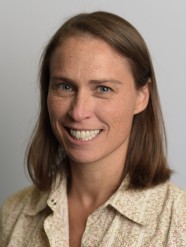 Dr. Claire Horner-Devine is a scientist with a passion for connecting people and ideas. Connection, community, creativity, agency, and problem solving are core values throughout all of her work.
Dr. Claire Horner-Devine is a scientist with a passion for connecting people and ideas. Connection, community, creativity, agency, and problem solving are core values throughout all of her work.
Dr. Horner-Devine’s professional experience spans the domains of science, higher education and equity. Her fluency in science and research, her agility in communication across professional cultures and settings, and her creative approach to strategy and leadership allow her to engage with partners using a unique perspective and set of tools.
Professional and leadership development. A significant focus of her work is at the national scale with professional development programs for early-career scientists from underrepresented groups in STEM. She is the co-founder and co-director of three national programs designed to accelerate and improve the career advancement of early-career women and researchers from underrepresented groups in STEM. Dr. Horner-Devine worked as the Director of Diversity and Leadership Development with the College of the Environment at the University of Washington, where she initiated the Broader Impacts Leadership Development (BILD) Program to connect scientific researchers with broader impacts programs, including formal and informal education, outreach and broadening participation in E-STEM. She has published her social science work in Frontiers in Ecology and Evolutionary Biology and CBE – Life Sciences Education.
Science and research. Dr. Horner-Devine worked as a faculty member in the School of Aquatic and Fishery Sciences at the University of Washington for eight years and currently serves as affiliate faculty. She received her Ph.D. in Biological Sciences from Stanford University and was awarded the Frances Lou Kallam Award for outstanding graduate student. She received her B.A. in Ecology and Evolutionary Biology from Princeton, graduating with Departmental High Honors and magna cum laude. Her scientific training is as a microbial community ecologist and conservation biologist, and her research program and laboratory group addressed questions in community ecology and microbial ecology. She has published her science in journals such as Nature, Science, Proceedings of the National Academy of Sciences, Conservation Biology and Ecology.